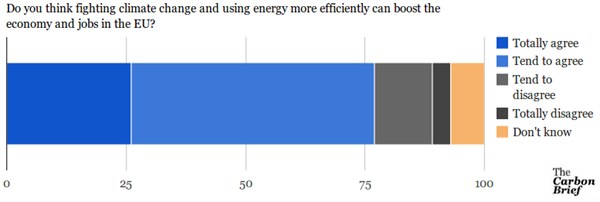Public support for climate policies doesn’t necessarily relate to concern over the seriousness of the issue, a new poll suggests.
Research carried out by the European Commission and released this week suggests the UK public is keen to combat climate change, even though many people don’t think it’s a particularly serious problem.
The poll reflects the UK government’s own data which shows public support for renewable energy and climate change related policies remains high, even if concern about climate change is more varied.
As always, the poll’s results have to be interpreted carefully, however.
Seriousness
The European Commission polled almost 30,000 people across the EU’s 27 countries. The results show that while the vast majority of Europeans say they believe climate change is a problem, Brits are less concerned than almost all of their continental neighbours.
Around 90 per cent of respondents said they thought climate change was either a “very” or “fairly” serious problem, the poll shows. Only nine per cent said they didn’t think it was a problem at all.
When asked to rank how serious a problem climate change is at the moment on a scale between 1 and 10 (with one being “not at all serious”, and 10 being “extremely serious”), the average score across all EU countries was 7.3.
 When the poll’s results are broken down, it reveals that the UK public is among the least concerned about climate change – as the graph below shows.
When the poll’s results are broken down, it reveals that the UK public is among the least concerned about climate change – as the graph below shows.
UK respondents had a country-wide average score of 6.1. Only those from Latvia and Estonia were less concerned, giving the problem a score of 6.0 and 5.6 respectively.
Every country ranked climate change as at least a “fairly serious” problem according to the poll’s criteria, however. So while the UK public is among the least concerned, it agrees with the rest of Europe that climate change is a problem.
Climate policies
Despite the majority of the UK public only thinking climate change is “fairly” serious, Brits remain largely supportive of policies to combat climate change.
In particular, the UK public appears to buy into the argument that implementing policies to tackle climate change can boost the economy – the message at the centre of the government’s calls for so-called green growth.
In response to a slightly leftfield question, over 75 per cent of UK respondents said they either “totally agree” or “tend to agree” that fighting climate change and using energy more efficiently can boost the economy and jobs in the EU, as the graph below shows.
 Furthermore, the poll suggests the UK public remains keen on supporting the development of renewable energy sources.
Furthermore, the poll suggests the UK public remains keen on supporting the development of renewable energy sources.
When asked how important it was that the government set targets to increase the amount of renewable energy the UK uses, an overwhelming majority of respondents – 88 per cent – said it was important, as this graph shows:
 So it seems the UK public is willing to back climate change-related policies, even if it’s not overly concerned about the problem right now. The news will encourage the government, which maintains there are benefits to decarbonising the UK’s economy which go beyond combatting climate change – an argument that seems to be resonating with the public.
So it seems the UK public is willing to back climate change-related policies, even if it’s not overly concerned about the problem right now. The news will encourage the government, which maintains there are benefits to decarbonising the UK’s economy which go beyond combatting climate change – an argument that seems to be resonating with the public.
Caveats
As is always the case with polling, care needs to be taken about extrapolating the results too far. It’s worth bearing in mind that people’s answers can be influenced by the wording of the questions and when they were asked.
The poll was carried out in the final week of November, just before storms battered the UK. The British public’s view on the seriousness of climate change may have changed in the aftermath of some of the most intense weather the UK has experienced in years, but won’t have been captured by this poll.
Moreover, people’s views on whether climate policy can be good for the economy may have been different if the question’s wording was changed. For instance, while people may believe fighting climate change can boost the EU’s economy, the survey didn’t ask people how likely they thought that is.
Likewise, while most respondents thought it was important for governments to set renewable energy targets, the poll didn’t ask what level people though they should be set at – meaning some people could want a target, but at a lower level than the UK’s current 15 per cent goal.
So while the poll gives a broad indication of what Europeans think about climate change – that it’s a problem, and policies addressing it could have wider benefits – people’s views may be a lot more nuanced than the poll reveals.


